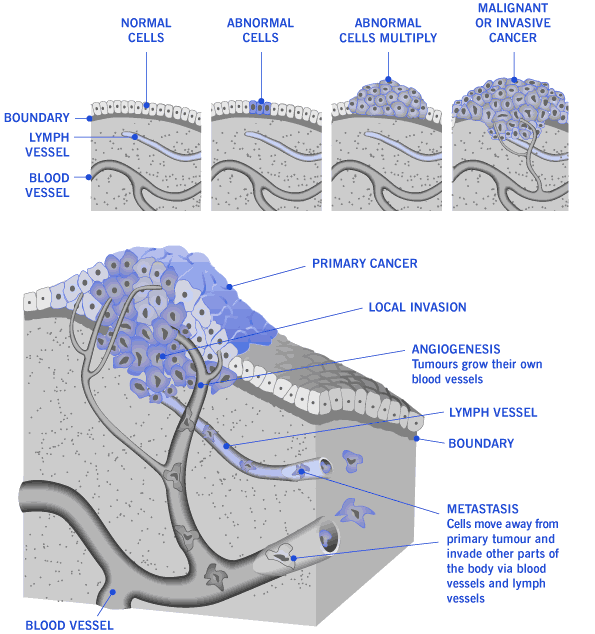|
WHAT IS CANCER?
Cancer is a disease in which cells
of an organ or tissue in the body become abnormal, failing to
 respond
to normal control mechanisms, growing and multiplying out of control.
Normal cells reproduce themselves throughout the body in an orderly and
controlled manner. respond
to normal control mechanisms, growing and multiplying out of control.
Normal cells reproduce themselves throughout the body in an orderly and
controlled manner. Normal growth continues throughout life to replace worn out tissue, to heal
wounds and to maintain healthy organs. When cells grow out of control, they
usually form a mass, called a tumour. Some tumours grow and enlarge only at the
site where they begin and these are referred to as benign tumours. Other tumours
not only enlarge locally but also have the potential to invade and destroy the
normal tissue around them and to spread to distant parts of the body. Such
tumours are called malignant tumours or cancers.
Normal growth continues throughout life to replace worn out tissue, to heal
wounds and to maintain healthy organs. When cells grow out of control, they
usually form a mass, called a tumour. Some tumours grow and enlarge only at the
site where they begin and these are referred to as benign tumours. Other tumours
not only enlarge locally but also have the potential to invade and destroy the
normal tissue around them and to spread to distant parts of the body. Such
tumours are called malignant tumours or cancers.
All plants and animals, including humans, are
made up of tiny units called cells. In an adult person there are about
1,000,000,000,000,000 cells. Cells vary in their size, shape and in what they
do. For example, a muscle cell is long and thin so it can contract or become
shorter. A cell on the surface of the skin is hard and flat like a paving stone
so it can protect your body from light and damage.
Most living cells contain special material
called deoxyribonucleic acid (DNA) that tells the cell what to do, when to
divide and when to die. Cells divide for growth or to replace other cells that
have died or have worn out.
Sometimes, the DNA gets damaged in some
way—this is known as a mutation. It causes the cell to act abnormally or in a
way that is different to other cells around it. It might divide in an
uncontrolled way, not die when it is supposed to or not do the job it is
supposed to do.
Usually as these abnormal cells divide and
grow, a mass of cells—or tumour—forms, but sometimes this doesn't happen.
Leukaemia is a cancer where abnormal white blood cells are produced, but travel
around the body in the bloodstream instead of forming a tumour.

Metastasis
When a tumour does not spread beyond the area
in which it first develops we call it a benign tumour. Benign tumours are not
cancerous. Tumours that keep growing and spread into surrounding areas are
called malignant or cancerous tumours.
Distant spread of a cancer
occurs when malignant cells become detached from the original (primary) tumour,
get carried to other parts of the body through the blood or lymphatic vessels
and establish themselves in the new site as an independent (secondary) cancer. A
tumour that has spread in this manner is said to have metastasized and the
secondary tumour, or tumours, is called a metastasis (or metastases).
|